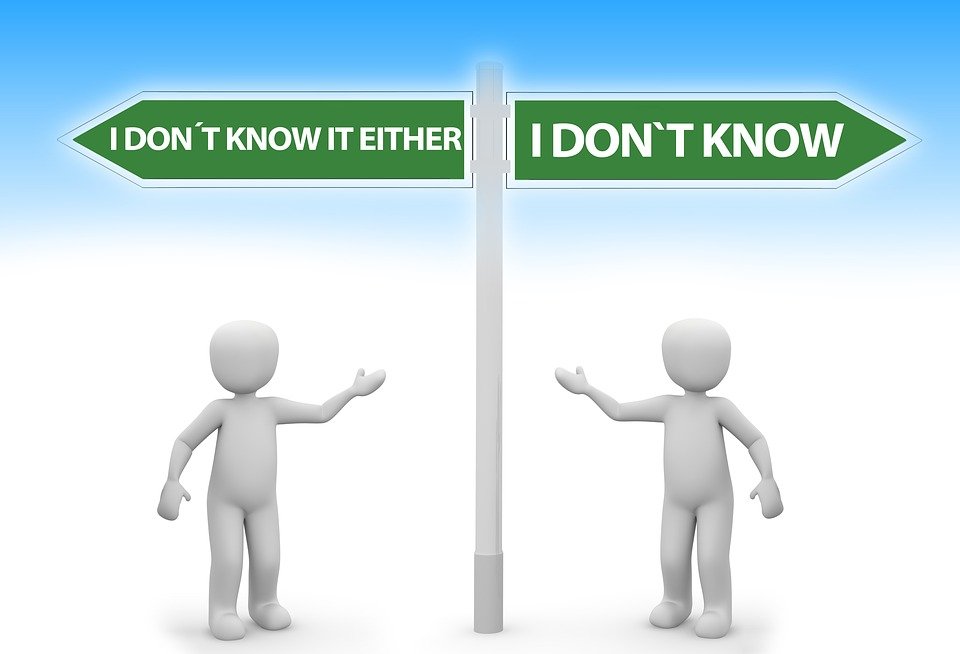And that's not only because it often is the truth, but also because it opens up a path to discovery and it closes the path to animosity between ideologies.

image by geralt - source: pixabay
Why, and I'm generalizing here, are we so afraid to admit to our children that we just don't know? When a kid asks his parents "why is the grass green", we adults often brush it of with a nonsense answer like "because the sky is blue and it would just not look right when they are switched" or just "because"... We are born with an insatiable thirst for knowledge, we're curious about everything. But from that first question we do everything to kill that curiosity a.s.a.p. Why not admit the truth: "I don't know" or even better, "I don't know, but let's go find out together, I never thought to ask that question but now you ask, it's very interesting!"
Encourage that curiosity! And encourage the path to discovery: we have mede a schooling system and a society in general where there's a taboo on being wrong or not knowing. In this age of exaggerated individualism everyone if personally responsible for their lot in life: if you're poor, you must have made the wrong choices. A wrong choice, or not having the right information, often even has consequences of an existential nature: you might lose your job, or be otherwise financially punished for your lack of knowledge. Not knowing and being wrong are discouraged to an insane degree in our civilized world.
This is terrible of course. What was the saying again? "It's better to have tried and failed than to never have tried at all." Yeah, right; tell that to the teacher who just graded your work with an F, or the employer who just kicked you out. By cultivating this fear of failure, we are blocking so many paths to discovery and betterment. Ever notice Hollywood rather spend hundreds of millions on a sequel in a series that has proven to be popular, than spend even 50 million on a truly new story outside the popular genres? Capitalism with it's need for constant profits makes us not take risks and choose the safe road almost every time.
I've heard science be described by scientists as "the art of not knowing" or "the ability to almost always be wrong". That's because true scientists don't know anything. The speak in terms of probability or likeliness: I'ts more probable that this or that is the case because repeated observations and logical analysis and tests show it to be right all the time. But in reality no one can say for sure if it will always be so or that it always has been so. Or that it is so everywhere. Also every time we find something new, when we've solved one puzzle, the answer always opens up multiple new questions. And there's no bigger enjoyment in science when a theory that's been the "truth" for decades finally is proven wrong or incomplete. That's why science doesn't want to be afraid to be wrong: even fi a hypothesis is proven wrong, we learn something new!

source: Creative Commons Images
I don't know if there's a God. I believe there isn't, so that would make me an atheist. I also act as if there's no God, because there's no reason for me to believe there is one. But I'm not saying that I know there's no God. How could I? Apart from the fact that it's impossible to prove that something doesn't exist, it would also place me in the camp of so called "militant atheists", like Sam Harris, Richard Dawkins, Christopher Hitchens (may he rest in peace) and Daniel Dennet: knowing for sure that here is, or that there is not a God sets you up against each other. Absolute opposites are born from absolute certainties. Why not be honest and say you can never be absolutely sure about anything at all.
Ultimately we need certain conventions about a common truth to enable us to discuss and exchange opinions about anything. Coming back to the kid's question about the color of the grass, we all know for certain that grass is green. Even if you're color-blind and see no color at all, or see a completely different color, we all call what we see "green". But the color green actually doesn't exist at all in the real world: green is part of a picture painted in our minds, it's only our interpretation of the reality around us. Richard Dawkins, who I do admire for a lot of the work he's done on evolutionary biology, asked an interesting question: can bats or other animals that use echo-location instead of eyesight to navigate their surroundings, have a sense of color? I don't remember all of it, but he put forward a lot of reasons why in an evolutionary and survival-sense it could be beneficial to "see" colors, so they probably do have some mechanism in their brains that enable them to distinguish colors. But will we ever know?
Not to say that "ignorance is bliss", but not knowing is the most blissful state we can be in, outside of the conventions needed to describe the approximation of reality we all share, because it enables us to push forward on our path of discovery about reality. Being wrong is the only way we'll ever learn something new. To learn something new we have to try something new and we'll inevitably fail at the first X attempts. Let's not discourage these two. Also don't mistake this little rant for an excuse to not inform yourself about the things necessary to survive and even thrive in this current reality. Knowledge gives you the power to really be responsible for your own actions: in court you cannot claim ignorance about the mortal effects of a bullet in one's head, you'll get live in prison because you know the bullet is deadly, and that knowledge makes you responsible for murder.
Thanks for absorbing yet another small philosophical rant from a non-philosopher ;-) I hope that it provided some food for thought, as that's essentially the goal here. And please do share your thoughts in the comments!

Recent articles you might be interested in:

Thanks for stopping by and reading. If you really liked this content, if you disagree (or if you do agree), please leave a comment. Of course, upvotes, follows, resteems are all greatly appreciated, but nothing brings me and you more growth than sharing our ideas. It's what Steemit is made for!


Just for Full Disclosure, I'm invested in these crypto-currencies:
Bitcoin | Litecoin | EOS | OmiseGo | FunFair | KIN | Pillar | DENT | Polymath | XDCE | 0x | Decred | Ethereum | Carmel | XYO
